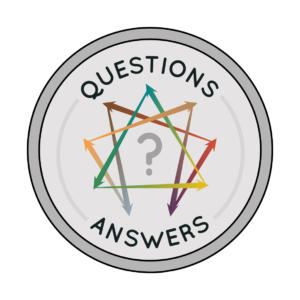For this blog, I started with some answers I believe are important in both teaching the Enneagram myself as well as teaching others to teach the system and watching them do so. As a result, I pose these three questions to you, each with five answers to choose from among so you can think about it. And then you get the answers!
Question 1 | Which of the following is the least important for trainers to know in-depth before they teach the Enneagram?
1. The 9 types, including worldviews, and thought, feeling and behavioral patterns
2. The use of wings and arrow lines
3. The 27 Enneagram subtypes
4. The history of the Enneagram
5. Skill development with the Enneagram
Answer | The history of the Enneagram
This is the least important for trainers to know in-depth. While it is important to know and share that the Enneagram has a long and ancient history, no one is really sure of its exact origins. Try to not spend too much time on this topic, as doing so may lead to unintentionally giving inaccurate information to participants. In addition, most people in organizations only want to know that it has a rich history; they are less interested in prolonged information about its history and more interested in how they can use it.
Question 2 | Which of the following is the most important factor for trainers to know before they teach the Enneagram?
1. The physical attributes associated with type
2. Famous people of each type
3. Their own Enneagram type
4. Short stories about each type
5. The types of the organization’s leaders
Answer | Their own Enneagram type
This is the most important factor among those listed. When trainers do not know their own types – or have mistyped themselves – it is highly likely they will be teaching some or most of the types inaccurately. When trainers don’t know their own type at all, they are challenged to convince participants that the Enneagram is a viable and usable system. I’ve heard some trainers admit they don’t know their type when they are teaching, and this gives the impression that it is either too hard or it doesn’t matter. In addition, participants look to trainers as good examples of the types the trainers say they represent. As a result, a mistyped trainer will unintentionally cause confusion about type among participants.
Question 3 | Which of the following factors does not accurately explain why the self-mastery of trainers is crucial when teaching the Enneagram?
1. Credibility | rationale | Trainers need to demonstrate high levels of self-mastery so they “walk-the-talk”
2. Interpersonal skills | rationale | Trainers with lower self-mastery may not interact effectively with participants
3. Training skills | rationale | Trainers with lower self-mastery can’t be good trainers, no matter what the content
4. Psychological spill-over | rationale | Trainers with insufficient self-mastery can unconsciously communicate negative information about types with which they have issues
5. Development information | rationale | Trainers with lower self-mastery will have more difficulty effectively teaching the development paths for the 9 types
Answer | Training skills | rationale | Trainers with lower self-mastery can’t be good trainers, no matter what the content
Actually, a person can have strong training design and training execution skills – lecturing, facilitating, etc. – and in areas other than the Enneagram or similar deep development systems, they may do well. This is particularly true if the training has a great deal of structured content and the trainer has a great deal of experience training a particular program.
Ginger Lapid-Bogda PhD, the author of six best-selling Enneagram-business books, is a speaker, consultant, trainer, and coach. She provides certification programs for professionals around the world who want to bring the Enneagram into organizations with high-impact business applications, and is past-president of the International Enneagram Association. Visit her website: TheEnneagramInBusiness.com. ginger@theenneagraminbusiness.com


Comments are closed.